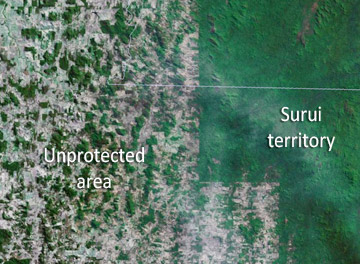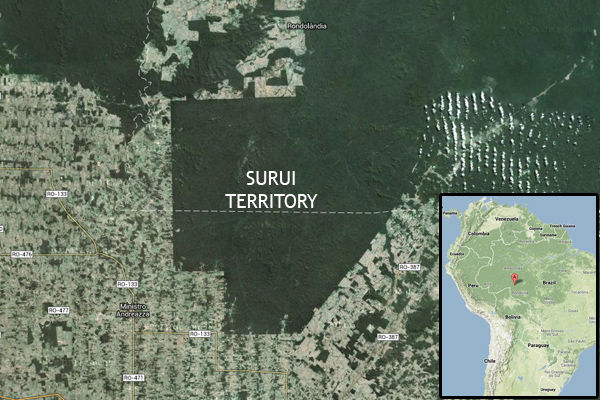An effort by an Amazonian tribe to protect their rainforest home against encroachment and illegal logging has finally been validated and verified under a leading carbon accounting standard, enabling it to begin selling carbon credits.
The Surui Forest Carbon Project, named after the indigenous Paiter Suruí tribe, has been in development for more than four years with the support of a number of heavyweight partners, including the Amazon Conservation Team, tech giant Google, Forest Trends, the law firm Baker & McKenzie, Brazil-based Idesam, and indigenous NGO Kanindé. The project emerged out of a decision by the tribe to pursue an economic development model that would preserve their forest home rather than selling it off to ranchers, industrial farmers, and loggers.
The Surui Forest Carbon Project is the first indigenous-led REDD+ project in the world. REDD+ generates carbon credits by reducing greenhouse gas emissions from deforestation and forest degradation. Globally, forest conversion and diminishment accounts for around ten percent of carbon emissions.
 The Surui have worked closely with Google Earth Outreach to develop ways to map and monitor their territory |
Chief Almir Suruí, a Suruí leader who conceived the project in 2007, said the project is could serve as a model for sustainable development by indigenous people elsewhere.
“REDD+ is a mechanism that unites our values and those of the non-indigenous capitalist world,” Almir said in a statement. “This is our contribution to forest preservation, but projects like this can only be achieved by people with a medium- to long-term perspective.”
“By going first, the Suruí have created a template for other indigenous people across the Amazon,” added Michael Jenkins, Forest Trends President and CEO.
According to a verification audit conducted by Imaflora and the Rainforest Alliance, activities conducted under the Surui project will save five million tons of CO2 from being emitted over the next 30 years. Those credits can now be sold to companies and individuals who want to voluntarily “offset” emissions they are not able to reduce on their own.

In a press release, Forest Trends laid out the process the Surui went through to get the project approved:
-
The project began when Chief Almir approached environmental nonprofit organization Forest Trends to see if carbon finance could be used to preserve the forest. Forest Trends then commissioned the law firm of Baker & McKenzie to see if the Suruí actually owned the rights to carbon in their trees. With that confirmation in hand, they brought in Idesam (Instituto de Conservação e Desenvolvimento Sustentavel do Amazonas/Institute for the Conservation and Sustainable Development of Amazonas) to determine which portions of the 248,147-hectare territory were in danger and estimate the carbon content. Idesam conservatively estimated that well over five million tons of carbon dioxide would be emitted if the Suruí didn’t act fast.
Over the next two years, Chief Almir worked with longstanding Suruí partners Kanindé (Associação de Defesa Etnoambiental Kanindé) and ECAM (Equipe de Conservação da Amazônia/Amazon Conservation Team) to help members of the Suruí understand the project in accordance with the principles of Free, Prior, and Informed Consent (FPIC) as articulated in Convention 169 of the International Labor Organization (ILO). In 2009, the four clans and 25 villages of the Suruí voted to impose and enforce a logging moratorium, and to work with Idesam to ensure that the impacts of the Suruí actions were measurable, reportable, and verifiable. In 2010, Funbio (Fundo Brasileiro da Biodiversidade/Brazilian Biodiversity Fund) joined the partnership to create the Surui Trust Fund and ensure that income from the project is managed responsibly and transparently. Local authorities, including Funai (Fundação Nacional do Índioissued/National Indian Foundation), have since endorsed the Suruí effort as a model project.
After extensive multidisciplinary review by independent experts, the VCS board and the Climate, Community, and Biodiversity Alliance agreed in 2012 that the steps the Suruí were taking would sequester at least five million tons of carbon dioxide over 30 years while protecting critical rainforest habitat. Verification, however, required further auditing by Imaflora (Instituto de Manejo e Certificação Florestal e Agrícola/Institute for the Management and Certification of Forests and Farms) and Rainforest Alliance to ensure that those steps were, in fact, being taken. During this time, the Suruí carried out patrols and worked with community members and government authorities to protect their forests.
Related articles